‘ProFile’, The National Theatre’s D/deaf and disabled actors database: One Year On
February 20, 2019

The National Theatre, Photo by Philip Vile.
There’s a running joke that says if you want to win an Oscar, play a disabled character. It might be dark, but it’s a common comment many actors with a disability make, irritated by having their personal experiences donned like a costume to evoke sympathy, and of course, earn awards. 16 percent of all the best actor and actress awards at the Oscars have been given for portrayals of disability or mental illness.
In the majority of cases, when the chance to play a character with a disability does arise, disabled actors can only watch as it is snapped up by their able-bodied peers, the chance to see someone like themselves on the screen or stage passing by once again. The National Theatre’s ProFile programme – introduced a year ago in collaboration with Spotlight, the UK’s largest casting agency – was designed to address this imbalance. One year on, how successful has it been?
In October 2017 the National Theatre unveiled a dedicated website with the aim of increasing the representation of D/deaf and disabled performers in the UK by hosting the portfolios and monologues of underrepresented talent for showcasing to industry professionals.
“We wanted far more representation of disability on our stages. Some of the casting directors didn’t know that many disabled actors,” says Charlotte Bevan, head of Diversity at the National Theatre. “There’s some really talented people in that group who deserved far more jobs than they were getting.” It became clear to Bevan that the National wasn’t doing enough.
Thus the importance of programmes like ProFile. While its website is designed in such a way to not track any communication between the casting director and actor, the site has had over 16,000 views, with 3,000 unique users in over 30 different countries around the world. “It’s been more successful than I could have hoped for … people are going back to it, which is really important,” she says.
In recent years, some disabled characters and talent have of course appeared on screen, including RJ Mitte in Breaking Bad, Liz Carr on Silent Witness, and James Moore on Emmerdale. Moore recently won ‘Best Newcomer’ at the National Television Awards – testament to the fact that there is an appetite for opportunities to be given to disabled talent. Cherylee Houston, known for her time at Coronation Street, also starred in a comedy for Radio 4. From the outside however, it seems like the stage has been slower in its enthusiasm for these more diverse castings.
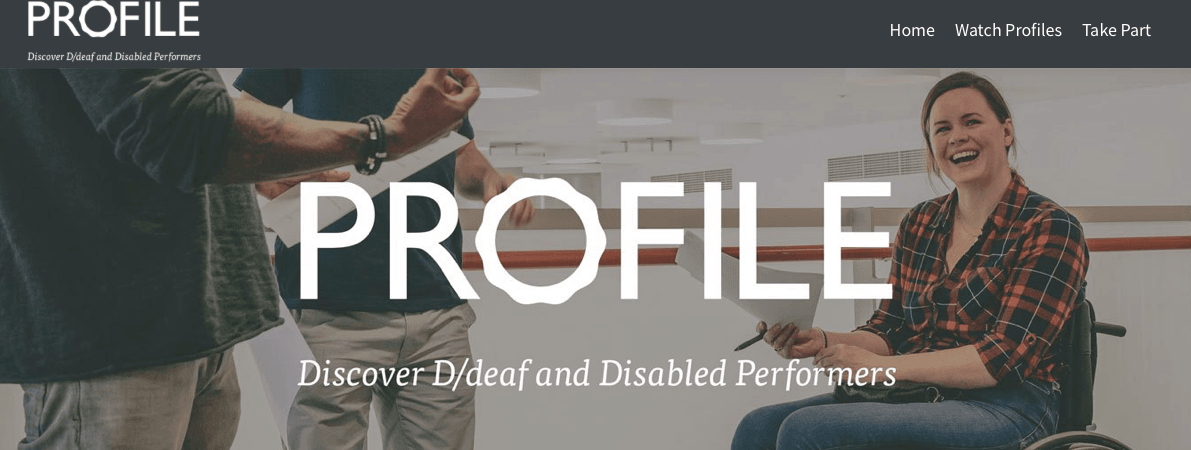
The ProFile Website page cover, courtesy of Charlotte Bevan.
But disabled actors still face many hurdles. The acting industry in general – whether it be stage or screen – can be often fickle or shallow. Having a recognisable name featuring in your cast is a must. Often casting directors won’t give unknown talent a chance. Though this is the case for both non-disabled and disabled actors, this is felt more acutely by disabled actors who are already working from a point of disadvantage. Hannah Ellis-Peterson put this perfectly in The Guardian, when she said “until disabled actors are given the boost they need to make them big names, then that’s going to be a self-fulfilling prophecy.”
Drama schools aren’t always equipped or educated enough to cope with the adaptations or support necessary to accommodate a disabled actor, especially if they have a more severe disability. In the past there have been a number of schemes specifically targeted at actors unable to access drama school, which proved extremely helpful but were not all renewed. Auditions and filming locations may also not meet accessibility requirements.
One of the biggest obstacles disabled actors face is getting casting directors to consider them for roles that may not have been explicitly written as disabled. Actor Shannon Murray, who stars in the BBC’s Class and is a wheelchair user, stated that in her 20-year career she has only been invited to two auditions where the role did not specify whether or not the character was paraplegic.
However, some critics argue that in a few cases it is not practical nor feasible to cast disabled actors. An actor with the same level of disability as Raymond Babbitt in Rain Man might not have been able to play the role. Similarly, it could be argued that an actor who has Motor Neurone Disease would not have been able to play Stephen Hawking before he developed the disease, as Eddie Redmayne did. But these are more extreme cases.
ProFile then is a positive development in the industry. Bevan explains that it was responsible for 20 castings in its first year. She says, “We’ve cast nine at the National in the last 12 months – and I know that there are plenty of others at the Young Vic, at Chichester and lots of other places… Most of them have played characters that weren’t written as disabled. They’ve been cast in roles where their disability has been incidental and irrelevant to the role.”
Today, 95 percent of disabled characters on television are played by able-bodied performers. That means in almost every situation, disabled people aren’t seeing any representation on-screen. Of course, the argument that able-bodied actors are not able to accurately portray the experiences of living with these conditions as well as a disabled actor could, is commonly accepted.
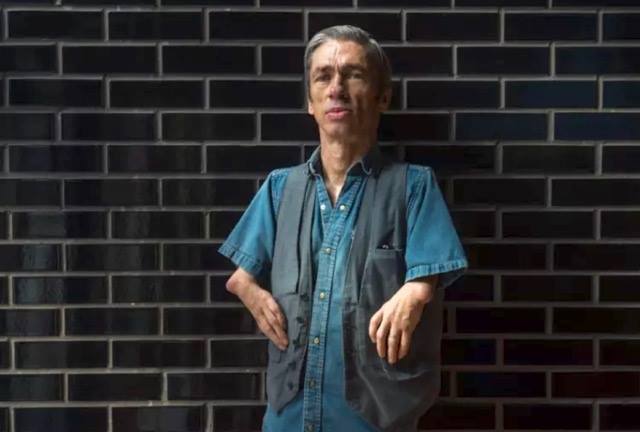
Mat Fraser, courtesy of Mat Fraser.
I spoke to actor Mat Fraser about the National Theatre’s latest development. Fraser famously starred in the hit TV show American Horror Story and played Shakespeare’s Richard III as part of Hull’s 2017 City of Culture celebrations. He has thalidomide-induced Phocomelia. “My hashtag is jobs not panels, because all I’m ever asked to be on is panels so people can do their disability-diversity day,” Mat says of programmes like ProFile. “Unless there’s actual input and actual exposure of actual actors in actual productions… it’s useless.” However, he adds, “Admittedly, in the last five years things have changed.”
But why is the industry so slow to reform? “It’s a difficult conversation to be had,” Bevan says. “As an industry I don’t think the conversation we have is sophisticated enough yet around disability and the portrayal of disabled characters because of a combination of fear, and people not knowing how to do it.”
Fraser agrees. “The major barrier to more successful inclusion of disabled actors in mainstream productions on stage and screen is this accumulated unspoken embarrassment around it,” he says. He saw a notable difference between how people would approach him before and after they had watched him in American Horror Story. “They’d seen me pick up a cup, kiss somebody, hold someone’s hand, and they felt like they knew me because I was in their living room. I, a disabled person, was in their living room – albeit in a horror characterisation – but they felt a connection with it. And immediately afterwards they were not embarrassed.”
“The last thing they want to do is embarrass the disabled person, or themselves. So deciding not to engage with the disabled person is more often than not what they do for fear of getting it wrong,” Fraser adds.
One year on, ProFile is continuing to grow, becoming more well-known and being shortlisted for the Innovation Award at The Stage Awards 2019. Other shortlisted initiatives include Talking Birds’ ‘The Difference Engine’ which provides captioning software for small-scale companies who usually cannot afford it, showing that the first shoots of progress are developing.
With the Royal Shakespeare Company, Disney, Netflix, BBC and Channel 4 all signing up to use its database, it could be argued ProFile has had a successful first year. There is “a lot of work to be done on making sure that we’re representing people properly,” says Bevan, “because I don’t think we’re there yet. We try to lead by example in many ways but we’re by no means perfect – it’s an ongoing conversation.”

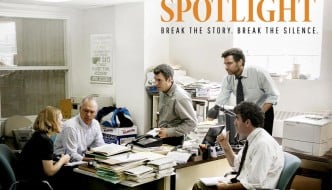
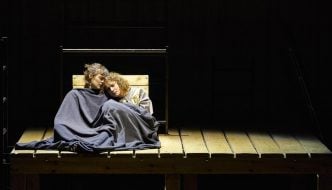
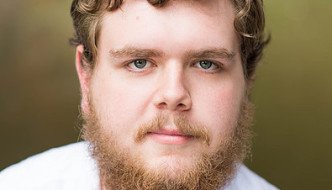
Comments